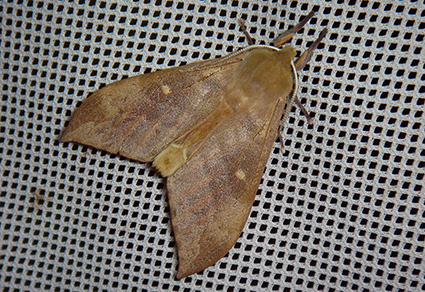Abstract
A new species of the genus Rhodambulyx Mell, 1939, Rhodambulyx xinyuae sp. nov., is described from Simianshan Nature Reserve in Southwest Chongqing, China. This species is similar to R. davidi Mell, 1939 and R. kitchingi Brechlin, 2015 in habitus, but can be distinguished by a different wing pattern, male genitalia structure and DNA barcode sequence. In addition, Rhodambulyx namvui Eitschberger & Nguyen, 2017 is removed from synonymy with R. kitchingi and synonymized instead with R. davidi, although whether it would be better treated as a subspecies of R. davidi requires further investigation.
References
Bertheau, C., Schuler, H., Krumböck, S., Arthofer, W. & Stauffer, C. (2011) Hit or miss in phylogenetic analyses: The case of the cryptic NUMTs. Molecular Ecology Resources, 11, 1056–1059. https://doi.org/10.1111/j.1755-0998.2011.03050.x
Brechlin, R. (2001) Rhodambulyx hainanensis, eine neue Schwärmerart aus China (Lepidoptera: Sphingidae). Nachrichten des entomologischen Vereins Apollo, Neue Folge, 22, 145–147.
Brechlin, R. (2015) Rhodambulyx kitchingi n. sp., eine neue Sphingide aus Vietnam (Lepidoptera: Sphingidae). Entomo-Satsphingia, 8, 5–7.
Brechlin, R. (2015) Zwei neue Unterarten von Rhodoprasina callantha Jordan, 1926 (Lepidoptera, Sphingidae). Entomo-Satsphingia, 8, 26–30.
Cadiou, J.-M. (1990) A new sphingid from Thailand: Rhodambulyx schnitzleri (Lepidoptera Sphingidae). Lambillionea, 90 (2), 42–48.
Chen, J. & Ou, X.H. (2008) Two new record species of Sphingidae (Lepidoptera) from China. Entomotaxonomia, 30 (1), 39–40.
Cheng, R., Xue, D.Y., Galsworthy, A., & Han, H.X. (2017) Complete mitochondrial genomes throw light on budding speciation in three Biston species (Lepidoptera, Geometridae). Zoologica Scripta, 46, 73–84. https://doi.org/10.1111/zsc.12184
Eitschberger, U. & Nguyen, H.B. (2017) Rhodambulyx namvui spec. nov., eine neue Schwärmerart aus Vietnam (Lepidoptera, Sphingidae). Neue Entomologische Nachrichten, 74, 172–192.
Eitschberger, U. (2018) Die Taxa des Genus Rhodambulyx Mell, 1939 mit neuer Synonymie (Lepidoptera, Sphingidae). Neue Entomologische Nachrichten, 75, 94–95.
Hall, T.A. (1999) BioEdit: A user-friendly biological sequence alignment editor and analysis program for Windows 95/98/NT. Nucleic Acids Symposium Series, 41, 95–98.
Huelsenbeck, J.P., Larget, B. & Alfaro, M.E. (2004) Bayesian phylogenetic model selection using reversible jump Markov Chain Monte Carlo. Molecular Biology and Evolution, 21, 1123–1133. https://doi.org/10.1093/molbev/msh123
Hu, S.J., Cotton, A.M., Condamine, F.L., Duan, K., Wang, R.J., Hsu, Y.F., Zhang, X. & Cao, J. (2018) Revision of Pazala Moore, 1888: the Graphium (Pazala) mandarinus (Oberthür, 1879) group, with treatments of known taxa and descriptions of new species and new subspecies (Lepidoptera: Papilionidae). Zootaxa, 4441 (3), 401–446. https://doi.org/10.11646/zootaxa.4441.3.1
Hu, S.J., Condamine, F.L., Monastyrskii, A.L. & Cotton, A.M. (2019) A new species of the Graphium (Pazala) mandarinus Group from Central Vietnam (Lepidoptera: Papilionidae). Zootaxa, 4554 (10, 286–300. https://doi.org/10.11646/zootaxa.4554.1.10
Ivshin, N., Krutov, V. & Romanov, D. (2018) Three new taxa of the genus Cechetra Zolotuhin & Ryabov, 2012 (Lepidoptera, Sphingidae) from South-East Asia with notes on other species of the genus. Zootaxa, 4450 (1), 1–25. https://doi.org/10.11646/zootaxa.4450.1.1
Kimura, M. (1980) A simple method for estimating evolutionary rates of base substitutions through comparative studies of nucleotide sequences. Journal of Molecular Evolution, 16, 111–120. https://doi.org/10.1007/BF01731581
Kitching, I.J. & Cadiou, J.-M. (2000) Hawkmoths of the World: an annotated and illustrated revisionary checklist (Lepidoptera: Sphingidae). Natural History Museum, London and Cornell University Press, Ithaca, New York, 226 pp., 8 pls.
Kumar, S., Stecher, G. & Tamura, K. (2016) Molecular evolutionary genetics analysis version 7.0 for bigger datasets. Molecular Biology & Evolution, 33, 1870–1874. https://doi.org/10.1093/molbev/msw054
Melichar, T., Řezáč, M. & Horecký, Č. (2014) A new species of the genus Rhodambulyx Mell, 1939 (Lepidoptera, Sphingidae) from Vietnam. The European Entomologist, 6, 161–165.
Mell, R. (1939) Beiträge zur Fauna sinica. XVIII. Noch unbeschriebene chinesische Lepidopteren (V). Deutsche Entomologische Zeitschrift, Berlin, 52, 135–152.
Mell, R. (1950) Aus der Biologie der chinesischen Actias Leach (Argema chapae sp. n., A. sinensis f. virescens f. n.). Entomologische Zeitschrift, 60, 6 & 7, 41–45 & 53–56.
Meyer, C.P. & Paulay, G. (2005) DNA barcoding: error rates based on comprehensive sampling. PLoS Biology, 3, e422. https://doi.org/10.1371/journal.pbio.0030422
Moore, F. (1888) Additional Species Family Papilionidae. In: Hewitson & Moore (1879–1888), Description of New Indian Lepidopterous Insects from the Collection of the Late Mr. W.S. Atkinson, M.A., F.L.S., & c., Director of the Public Instruction, Bengal. Rhopalocera. Part III. Asiatic Society of Bengal, Calcutta, pp. 283–285.
Wu Y. & Naumann, S. (2006) The preimaginal instars of Actias chapae (Mell, 1950) (Lepidoptera: Saturniidae). Nachrichten des entomologischen Vereins Apollo, Neue Folge, 27, 1/2, 17–21.
Mutanen, M., Kivelä, S.M., Vos, R.A., Doorenweerd, C., Ratnasingham, S., Hausmann, A., Huemer, P., Dincă, V., van Nieukerken, E.J., Lopez-Vaamonde, C., Vila, R., Aarvik, L., Decaëns, T., Efetov, K.A., Hebert, P.D.N., Johnsen, A., Karsholt O., Pentinsaari, M., Rougerie, R., Segerer, A., Tarmann, G., Zahiri, R. & Godfray, H.C.J. (2016) Species-level para- and polyphyly in DNA barcode gene trees: strong operational bias in European Lepidoptera. Systematic Biology, 65, 1024–1040. https://doi.org/10.1093/sysbio/syw044
Nässig, W.A., Naumann, S. & Rougerie. (2010) Evidence for the existence of three species in the genus Archaeoattacus (Lepidoptera: Saturniidae). The Journal of Research on the Lepidoptera, 43, 37–47.
Řezáč, M. (2018) Notes on the taxonomy of the genus Rhodoprasina Rothschild & Jordan, 1903 (Lepidoptera, Sphingidae) with the description of a new species. The European Entomologist, 10 (1), 185–206.
Song, H., Buhay, J.E., Whiting, M.F. & Crandall, K.A. (2008) Many species in one: DNA barcoding overestimates the number of species when nuclear mitochondrial pseudogenes are coamplified. PNAS, 105, 13486–13491. https://doi.org/10.1073/pnas.0803076105
Thompson, J.D., Higgins, D.G. & Gibson, T.J. (1994) CLUSTAL W: Improving the sensitivity of progressive multiple sequence alignment through sequence weighting, position-specific gap penalties and weight matrix choice. Nucleic Acids Research, 22, 4673–4680. https://doi.org/10.1093/nar/22.22.4673
Xie, W.G., Lewis, P.O., Fan, Y., Kuo, L. & Chen, M.H. (2011) Improving marginal likelihood estimation for Bayesian phylogenetic model selection. Systematic Biology, 60, 150–160. https://doi.org/10.1093/sysbio/syq085
Xu, Z.B., Wang, Y.Y., Condamine, F.L., Cotton, A.M. & Hu, S.J. (2020) Are the Yellow and Red Marked Club-Tail Losaria coon the same species? Insects, 11, 392, 1–23. https://doi.org/10.3390/insects11060392
Zhang, D., Gao, F.L, Jakovlic, Zou, H., Li, W.X. & Wang, G.T. (2020) PhyloSuite: An integrated and scalable desktop platform for streamlined molecular sequence data management and evolutionary phylogenetics studies. Molecular Ecology Resources, 20, 348–355. https://doi.org/10.1111/1755-0998.13096
Zhang, W.W. (2013) No Title [Introduction to cover photo Actias chapae]. Bulletin of Biology, 48, 4. https://doi.org/10.1016/j.materresbull.2012.10.030


